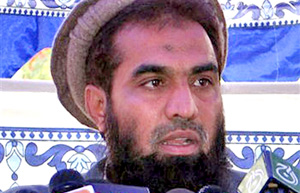Islamabad, Dec 18: In a decision that caused outrage in India, a Pakistani court today gave bail to LeT operations commander Zakiur Rehman Lakhvi, a key planner of the 26/11 Mumbai terror attacks, just a day after Prime Minister Nawaz Sharif said there is no 'good' and 'bad' Taliban.
"Anti-Terrorism Court Islamabad Judge Kausar Abbas Zaidi today granted bail to Zakiur Rehman Lakhvi," prosecution chief Chaudhry Azhar told reporters.
54-year-old Lakhvi and six others had filed bail applications yesterday in the midst of a lawyers strike to condemn the Peshawar school massacre that left 148 people, mostly children, dead.
Azhar said the prosecution had to produce more witnesses before this decision had come which they were not expecting.
"We were not expecting this decision as we have to produce a good number of witnesses in the case. We are awaiting the court's detailed order before giving further comment on the decision," he said.
Lakhvi's counsel advocate Raja Rizwan Abbasi told media persons that the court had granted bail as "evidence against Lakhvi was deficient".
The decision triggered quite an uproar in Indian political parties across the board as they accused Pakistan of sheltering terrorists. It also came under attack from the prosecutor in the Ajmal Kasab case, Ujwal Nikam.
The Indian mission here is also preparing a strong response against the grant of bail to Lakhvi.
Abbasi said the defence would soon file bail applications of the other six accused. The in-camera hearing of the case was held at Adiala Jail Rawalpindi due to security concerns.
The judge adjourned the hearing till January 7.
The seven accused - Lakhvi, Abdul Wajid, Mazhar Iqbal, Hamad Amin Sadiq, Shahid Jameel Riaz, Jamil Ahmed and Younis Anjum - are facing trial at the Adiala Jail in Rawalpindi.
His release from jail comes a day after Pakistan Prime Minister Sharif pledged to announce a "national plan" to tackle terrorism within a week, saying "this entire region" should be cleaned of terrorism.
"We announce that there will be no differentiation between 'good' and 'bad' Taliban and have resolved to continue the war against terrorism till the last terrorist is eliminated," Sharif had said after an all party meeting to discuss counter terrorism measures in the wake of the Peshawar massacre.
The trial of the seven suspects has progressed at a snail's pace due to repeated adjournments and various technical delays.
Lakhvi, the operational head of the banned Laskhar-e- Taiba, was one of the key planners of the Mumbai attack that killed 166 people.
Nine of the terrorists involved in the attack were killed by Indian security forces.
The only surviving attacker, Ajmal Kasab, was hanged after conviction by a trial court that was confirmed and upheld by higher courts in India.
In February 2009 Rehman Malik, the then adviser to the prime minister on the interior, had announced that Lakhvi was in custody and under investigation as the foremost mastermind behind the Mumbai attacks.
In November the same year, the anti-terrorism court formally charged seven suspects, including Lakhvi, with planning and helping execute the Mumbai attacks.






Comments
Add new comment